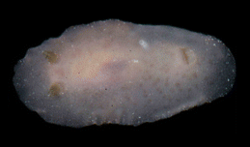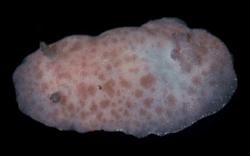Biology:Jorunna spazzola
| Jorunna spazzola | |
|---|---|

| |
| Dorsal view of Jorunna cf. spazzola | |

| |
| Dorsal view of Jorunna cf. spazzola | |
| Scientific classification | |
| Kingdom: | |
| Phylum: | |
| Class: | |
| (unranked): | clade Heterobranchia
clade Euthyneura clade Nudipleura clade Nudibranchia clade Euctenidiacea clade Doridacea |
| Superfamily: | |
| Family: | |
| Genus: | |
| Species: | J. spazzola
|
| Binomial name | |
| Jorunna spazzola (Marcus, 1955)[1]
| |
| Synonyms[2][3] | |
|
Awuka spazzola Er. Marcus, 1955 | |
Jorunna spazzola is a species of sea slug, a dorid nudibranch, a shell-less marine gastropod mollusc in the family Discodorididae.[2]
Taxonomy
It is possibly synonymous with Jorunna luisae.[4]
Camacho-García et al. (2014)[5] suggested Caribbean animals identified as Jorunna spazzola could constitute a distinct species, because they display external differences with the original description from southern Brazil.[3]
Distribution
This species was described from Brazil . The distribution of Jorunna spazzola includes Florida,[6] Honduras, Costa Rica, Venezuela, Cuba, Curaçao, Barbados, Virgin Islands, Turks and Caicos, Brazil and Panama.[3]
Description
The body is oval.[3] The mantle is rigid.[3] Dorsum is flattened and covered with small caryophyllidia.[3] Branchial leaves are very short.[3] Background color is translucent gray with a few darker gray or brown patches over the dorsum.[3] Mantle margin is surrounded by small opaque white glands.[3] Rhinophores and gill are the same color as the rest of the body.[3] It is up to 18 mm long[3] or up to is 36 mm.[7]
According to Rudman (2008), this species is known mostly from internal characters and needs clarification.[8]
Ecology
Minimum recorded depth is 0 m.[7] Maximum recorded depth is 1.5 m.[7] It was found under rocks in Panama.[3]
Prey of Jorunna spazzola include sponges of the order Haplosclerida: Callyspongia pallida and Chalinula sp.[9] It is well camouflaged on its prey.[3] This species is able to quickly change colors as a response to unknown environmental cues.[3]
References
This article incorporates Creative Commons (CC-BY-4.0) text from the reference[3]
- ↑ Marcus Er. (1955). Opisthobranchia from Brazil. Boletim da Facultade de Filosofia, Ciencias e Letras da Universidade de Sao Paulo, Zoologia 20: 89–261.
- ↑ 2.0 2.1 Bouchet, P. (2015). Jorunna spazzola (Marcus, 1955). In: MolluscaBase (2015). Accessed through: World Register of Marine Species on 2015-10-11
- ↑ 3.00 3.01 3.02 3.03 3.04 3.05 3.06 3.07 3.08 3.09 3.10 3.11 3.12 3.13 3.14 Goodheart J. A., Ellingson R. A., Vital X. G., Galvão Filho H. C., McCarthy J. B., Medrano S. M., Bhave V. J., García-Méndez K., Jiménez L. M., López G. & Hoover C. A. (2016). "Identification guide to the heterobranch sea slugs (Mollusca: Gastropoda) from Bocas del Toro, Panama". Marine Biodiversity Records 9(1): 56. doi:10.1186/s41200-016-0048-z
- ↑ Camacho-García Y. E. & Gosliner T. M. (2008). "Systematic revision of Jorunna Bergh, 1876 (Nudibranchia: Discodorididae) with a morphological phylogenetic analysis". Journal of Molluscan Studies 74: 143-181. doi:10.1093/mollus/eyn002.
- ↑ Camacho-García Y., Pola M., Carmona L., Padula V., Villani G. & Cervera L. (2014). "Diversity and distribution of the heterobranch sea slug fauna on the Caribbean of Costa Rica". Cah Biol Mar. 55: 109–127.
- ↑ Jorunna spazzola. Photo A. DuPont at Medslugs.de.
- ↑ 7.0 7.1 7.2 Welch J. J. (2010). "The “Island Rule” and Deep-Sea Gastropods: Re-Examining the Evidence". PLoS ONE 5(1): e8776. doi:10.1371/journal.pone.0008776.
- ↑ Rudman W. B. (2001 September 20). Jorunna cf. spazzola (Marcus, 1955). Sea Slug Forum. Australian Museum, Sydney.
- ↑ Belmonte T., Alvim J., Padula V. & Muricy G. (2015). "Spongivory by nudibranchs on the coast of Rio de Janeiro state, southeastern Brazil". Spixiana 38(2): 187–195. PDF.
Wikidata ☰ Q3810113 entry
 |

